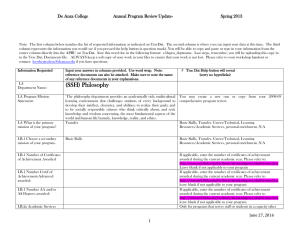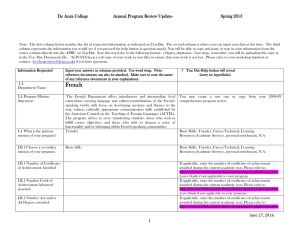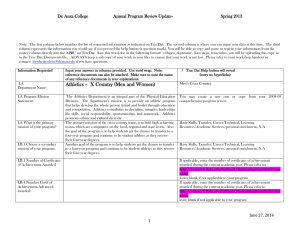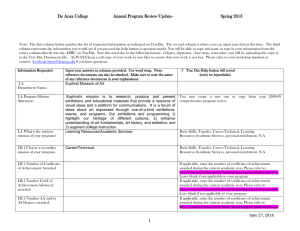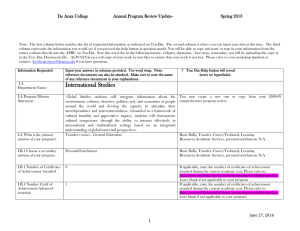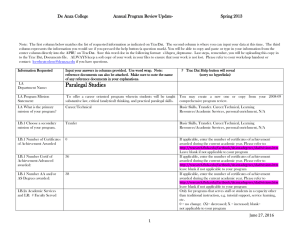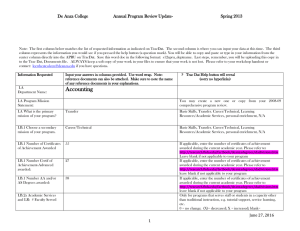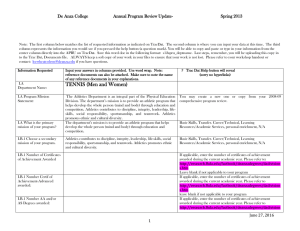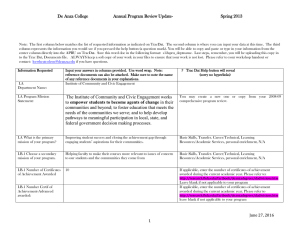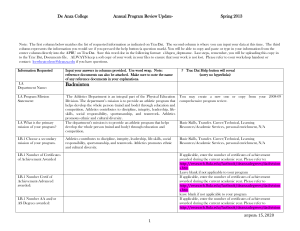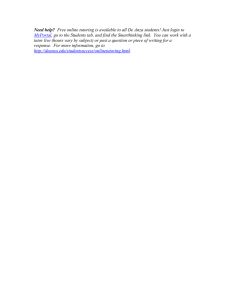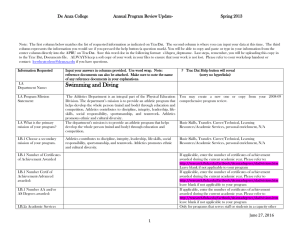Business Program Review
advertisement
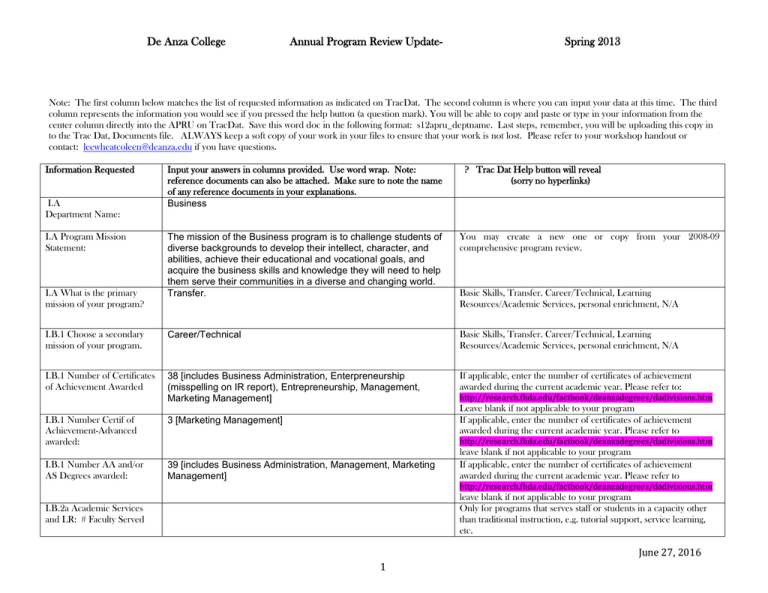
De Anza College Annual Program Review Update- Spring 2013 Note: The first column below matches the list of requested information as indicated on TracDat. The second column is where you can input your data at this time. The third column represents the information you would see if you pressed the help button (a question mark). You will be able to copy and paste or type in your information from the center column directly into the APRU on TracDat. Save this word doc in the following format: s12apru_deptname. Last steps, remember, you will be uploading this copy in to the Trac Dat, Documents file. ALWAYS keep a soft copy of your work in your files to ensure that your work is not lost. Please refer to your workshop handout or contact: leewheatcoleen@deanza.edu if you have questions. Information Requested I.A Department Name: I.A Program Mission Statement: Input your answers in columns provided. Use word wrap. Note: reference documents can also be attached. Make sure to note the name of any reference documents in your explanations. Business ? Trac Dat Help button will reveal (sorry no hyperlinks) The mission of the Business program is to challenge students of diverse backgrounds to develop their intellect, character, and abilities, achieve their educational and vocational goals, and acquire the business skills and knowledge they will need to help them serve their communities in a diverse and changing world. Transfer. You may create a new one or copy from your 2008-09 comprehensive program review. I.B.1 Choose a secondary mission of your program. Career/Technical Basic Skills, Transfer. Career/Technical, Learning Resources/Academic Services, personal enrichment, N/A I.B.1 Number of Certificates of Achievement Awarded 38 [includes Business Administration, Enterpreneurship (misspelling on IR report), Entrepreneurship, Management, Marketing Management] If applicable, enter the number of certificates of achievement awarded during the current academic year. Please refer to: I.A What is the primary mission of your program? Basic Skills, Transfer. Career/Technical, Learning Resources/Academic Services, personal enrichment, N/A http://research.fhda.edu/factbook/deanzadegrees/dadivisions.htm Leave blank if not applicable to your program If applicable, enter the number of certificates of achievement awarded during the current academic year. Please refer to I.B.1 Number Certif of Achievement-Advanced awarded: 3 [Marketing Management] I.B.1 Number AA and/or AS Degrees awarded: 39 [includes Business Administration, Management, Marketing Management] http://research.fhda.edu/factbook/deanzadegrees/dadivisions.htm leave blank if not applicable to your program If applicable, enter the number of certificates of achievement awarded during the current academic year. Please refer to http://research.fhda.edu/factbook/deanzadegrees/dadivisions.htm leave blank if not applicable to your program Only for programs that serves staff or students in a capacity other than traditional instruction, e.g. tutorial support, service learning, etc. I.B.2a Academic Services and LR: # Faculty Served June 27, 2016 1 De Anza College Annual Program Review Update- I.B.2a Academic Services and LR: # Student Served I.B.2a Academic Services and LR: # Staff Served II.A.1-Growth and Decline of targeted student populations II.A.2 Trends in equity gap: II.A.3 Closing the student equity gap: There was an increase of 40 students (3%) in the targeted populations from 2010/11 to 2011/12. Thus, the percentage of our student population represented by our target groups increased from 25% to 28%. The percent of success among targeted populations increased from 57% to 60%. The gap in success rates between targeted and non-targeted populations has decreased from 18% to 14% from 2010/11 to 2011/12. We saw an increase in student success across every targeted group except Native Americans. We saw a 4 percentage point improvement overall. Our efforts to improve the student equity gap would be enhanced if we had data on membership in the targeted populations at the course level. This would allow for more immediate feedback for the instructor on the effectiveness of various pedagogical methods on the success of the targeted populations. At present, we only get equity data through this APRU process once per year at the department level. II.A.4 Overall growth/decline in # students: We recognize that many of our students continue to have basic skills deficits, especially English language skills and numeracy. These skills are essential to student success. We have seen a decrease of 337 students from 2010/11 to 2011/12, a 6.6% decline overall. This is fully explained by a 9% Spring 2013 0 = no change; (X)= decreased; X = increased; blank= not applicable to your program Only for programs that serves staff or students in a capacity other than traditional instruction, e.g. tutorial support, service learning, etc. 0 = no change; (X)= decreased; X = increased; blank= not applicable to your program Only for programs that serves staff or students in a capacity other than traditional instruction, e.g. tutorial support, service learning, etc. 0 = no change; (X)= decreased; X = increased; blank= not applicable to your program Briefly, address student success data relative to your program Growth or decline in targeted populations (Latina/o, African Ancestry, Pacific Islander, Filipino) refer to the sites: (Program reviews 2008 - 2010 available at: http://research.fhda.edu/programreview/DAProgramReview/DeAnza_PR_ Div_pdf/DeAnzaProgramReviewDiv.htm AND program review data 201011 & 2011-12 at http://www.deanza.edu/ir/program-review.html) Refer to http://www.deanza.edu/president/EducationalMasterPlan20102015Final.pdf, p.16. Briefly address why this has occurred. What progress or achievement has the program made relative to the plans stated in your program’s 2008 -09 Comprehensive Program Review, Section III.B, towards decreasing the student equity gap? See IPBT website for past program review documentation: http://deanza.edu/gov/IPBT/program_review_files.html If a rationale for your strategies was not stated in the 2008-2009 CPRU, then briefly explain now. Briefly address the overall enrollment growth or decline of a comparison between all student populations and their success. June 27, 2016 2 De Anza College II.B Changes imposed by internal/external regulations II. C Progress in “Main Areas of Improvement” Annual Program Review Update- reduction in the number of sections offered, reflecting the uncertain budget environment with which we have been struggling. Due to the passage of SB 1440, our department implemented a Business Transfer Degree last year. We need to coordinate with Counseling to migrate from individual CSU transfer requirements to the Business Transfer Degree that guarantees junior level status. We found that Counseling is often still recommending individual CSU requirements, rather than encouraging student to take the Transfer Degree. The transfer degree would also help bolster enrollments. Our department’s main focus area designated in 2008/9 was catching up on the definition and assessment of student learning outcomes. Since 2008/9 the percentage of courses for which we have SLOs defined has gone from 0% to 100%. The percentage of our courses for which all SLOs have been assessed at least once has increased from 0% (2008/9) to 100%. Please note that this may not be reflected in the TracDat tallies because most of our SLOAC reports were recorded in ECMS. (They are archived in a TracDat folder.) II. D CTE Programs: Impact of External Trends: Address program changes implemented as a response to changes in College/District policy, state laws, division/department/program level requirements or external agencies regulations? How did the change(s) affect your program? (e.g. any curriculum, program reorganization, staffing etc.) Based on the 2008-09 Comprehensive Program Review, Section I.C. "Main Areas for Improvement", briefly address your program's progress in moving towards assessment or planning or current implementation of effective solutions. Career Technical Education (CTE) programs, provide regional, state, and labor market data, employment statistics, please see "CTE Program Review Addenda" at: www.deanza.edu/gov/IPBT/resources.html Identify any significant trends that may affect your program relative to: 1) Curriculum Content; 2) Future plans for your program e.g. enrollment management plans. Career Technical Education (CTE), provide recommendations from this year's Advisory Board (or other groups outside of your program, etc.) Briefly, address any significant recommendations from the group. Describe your program's progress in moving towards assessment or planning or current implementation of effective solutions. Give the percentage of Program Level Outcome statements assessed to date. Run report entitled “XXX PLOAC work” and scroll to the bottom of the report for counts. Then calculate #Reflections & Analysis/#PLO statement times 100. This percentage may be over 100% or 0%. All courses and programs are to be assessed before the Comprehensive Program Review in Spring 2014. II. E CTE Programs: Advisory Board Input: III.A. 1 PLOAC Summary Spring 2013 17% June 27, 2016 3 De Anza College III.A.2 Enhancement based on PLOAC assessment Annual Program Review Update- Last year, 13 full and part time Business instructors met to conduct a PLOAC for the Business Program overall, focused in particular on transfer students. Spring 2013 State an enhancement that was enacted this year as a direct result of an assessment of a program level outcome. State PLO statement, enhancement and reason for choosing this enhancement. If none, write “NONE”. Business Program Overall: Each student shall acquire the knowledge and skills described in the course level SLOs of the Business course that student completed at De Anza College. Based on our PLOAC meeting last year, we decided to improve SLO statements for three courses: Bus 90, Bus 56, and Bus 91. These changes are in process. III.B.1 SLOAC Summary This quarter we will begin to work towards surveying AA students (in Business Administration, Marketing Management, and Management) to assess Program Level Outcomes for these degree programs. 115% TracDat data is incorrect for this because most of our SLOAC reports were done in ECMS and only archived in TracDat. III.B.2 Enhancement based on SLOAC assessment We have assessed all SLOs for all of our 19 Business courses (excluding cross-listed courses owned by other departments). In fact, a few courses have been assessed more than once. We have 22 SLOAC reports for 19 courses or 115% done. Business 91: Personal Financial Planning (SLO1: Demonstrate a knowledge of opportunity costs and the time value of money.) The enhancement was that the current instructor created an assignment to focus more attention on the time value of money concept. Business 91: Personal Financial Planning (SLO2: Prepare, explain and analyze personal financial statements including the balance sheet and cash flow statement.) The enhancement was a new assignment that required students to create personal financial statements. Business 10: Introduction to Business (SLO2: Demonstrate a working vocabulary of business terms.) The enhancement was that the instructor added a video on “distribution channels” to help students understand this term more fully. Give the percentage of Student Level Outcome statements assessed to date. Run report entitled “CIS SLOAC work” and scroll to the bottom of the report for counts. Then calculate #(Reflections & Analysis + #Archived from ECMS) /#SLO statement times 100. This percentage may be over 100% or 0%. All courses and programs are to be assessed before the Comprehensive Program Review in Spring 2014. State an enhancement that was enacted this year as a direct result of an assessment of a student learning outcome. State course, SLO statement, enhancement and reason for choosing this enhancement. If none, write “NONE”. June 27, 2016 4 De Anza College IV. A Budget Trends IV.B Enrollment Trends V. A.1 -Faculty Position Needed V. A.2 Justification for Faculty/Staff Positions: Annual Program Review Update- Our department budget of $1000 per year has not changed in recent years. However materials fees which paid for copying have now been eliminated by the college. This puts pressure on our division’s B budget. Budget constraints resulted in the number of sections offered being reduced which has caused a 6.6% decrease in enrollment. Replace due to Vacancy Since the 2008/9 Program Review, we have lost 2 full time instructors. We currently have a hiring committee open for one replacement, but we would like to hire another. We estimate our Percent Full-time FTEF to be approximately 34% based on the Institutional Research data from 2011/12. Because Full Time faculty have required office hours on campus and are available for committee work, this would strengthen our program and support student success. V. A.3 Staff Position Needed V. A.4 Equipment Request Under $1000 V. A.5 Equipment Title and Description, Quantity A new Scantron machine 888P+ (or equivalent) for the BUS/CS division. This is new instructional equipment which will last at least 10 years on our campus. It requires no new infrastructure. V. A.6 Equipment Justification There are only a few Scantron machines on campus (F-6, Child Development, and DLC) and several of them have broken during this academic year. Since these are so heavily used (especially for capturing that all-important SLO data), could we have a Scantron Machine for the Division? It would be a tragedy for our students if none of the instructors could scan final exams one quarter, because all the grades would be delayed. V. A.7 Facility Request Spring 2013 Assess the impact of external or internal funding trends upon the program and/or its ability to serve its students. If you don’t work with Budget, please ask your Division Dean to give you the information. Assess the impact of external or internal funding changes upon the program’s enrollment and/or its ability to serve its students. If you don’t work with Enrollment Trends, please ask your Division Dean to give you the information. A drop down menu will allow you to choose: Replace due to Vacancy, Growth, None Needed Unless Vacancy If there is a request for one or more new faculty state the SLO/PLO assessment data, reflection, and enhancement that supports this need. A drop down menu will allow you to choose: Replace due to Vacancy, Growth, None Needed Unless Vacancy Only make request for staff if relevant to your department only. Division staff request should be in the Dean’s summary. A drop down menu will allow you to choose: Under $1,000 or Over $1,000 or no equipment requested Description should identify if the item(s) are new or replacement(s), furniture/fixtures, instructional equipment, technology related, expected life of item, recommended warrantees etc. Did this request emanate from a SLOAC or PLOAC process? Does this item require new or renovated infrastructure (eg wireless access, hardwire access, electric, water or heat sources . . . ) Who will use this equipment? What would the impact be on the program with or without the equipment? What is the life expectancy of the current equipment? How does the request promote the college mission or strategic goals? Etc. Name type of facility or infrastructure items needed. Renovation vs June 27, 2016 5 De Anza College Annual Program Review Update- V. A.8 Facility Justification V.B.1 Budget Augmentation We need to request a budget augmentation for printing costs of about $6000 annually to compensate for the elimination of material fees. For any other budget concerns, please refer to the Dean’s summary. V.B.2 Staff Development Needs V.B.3 Future plans Submitted by: Last Updated: Richard Brien, Emmanuele Cappello, Michele Fritz (fritzmichele@deanza.edu, X8615), Emily Garbe, Guilliermo Hernandez, Byron Lilly, Dan Salah, Sandra Spencer, and Lale Yurtseven. 5/03/13 Spring 2013 new. Identify associated structures needed to support the facility e.g. furniture, heat lamps, lighting, unique items above and beyond what is normally included in a similar facility Who will use this facility? What would the impact be on the program with or without the facility? What is the life expectancy of the current facility? How does the request promote the college mission or strategic goals? Etc. How much? Who/what could be supported if this additional funding was awarded? What would the impact be on the program with or without the funds? How does the request promote the college mission or strategic goals? If you do not deal with the B budget directly, you can use the comment: “please refer to the Dean’s summary”. What assessment led to this request? What would the impact be on the program with or without the funds? How does the request promote the college mission or strategic goals? How do you plan to reassess the outcomes of receiving each of the additional resources requested above? APRU writer’s name, email address, phone ext. Give date of latest update (Set next box to YES when done and ready for Dean review). June 27, 2016 6
